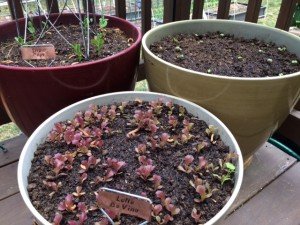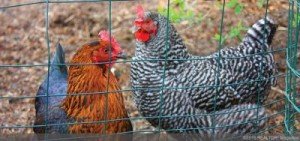Last night was a low of 28 so the tomatoes were covered (again) and I am optimistic that it was the last night of freezing temps (again). This time, at least, I have the Average Last Frost Date in my corner...though average and last possible vary by over a month.I the meantime, the container garden on my deck planted with cold weather crops is just fine with or without a light frost. The beautiful colors and daily growth of of these varietals make warmer weather feel not so far away.This is my first year growing Lollo De Vino Lettuce. I had run out of room in the garden for another lettuce but it was just to pretty to resist when I ran across it so I am growing it in a container along with a volunteer cilantro. Another first year variety, the French Breakfast Radishes have sprouted. I planted Snow Peas in the container garden this year to add some height contrast to the low growing lettuce and radishes. The easy access to peas and shoots is a total bonus.Today's cold weather task is to give some overdue attention to the indoor basil garden which needs some pruning and thinning.Happy Average Last Frost Date (for Raleigh NC)!
I planted Snow Peas in the container garden this year to add some height contrast to the low growing lettuce and radishes. The easy access to peas and shoots is a total bonus.Today's cold weather task is to give some overdue attention to the indoor basil garden which needs some pruning and thinning.Happy Average Last Frost Date (for Raleigh NC)!
Farming the Burbs
Two of my great passions collided earlier this week when a colleague forwarded a recent REALTOR® Magazine, July/August 2015 issue article about the "emerging real estate niche" of backyard agriculture. My day job that I absolutely love is in the real estate industry where we like distinct categories for types of real estate. Properties are classified as either Residential or Farm, but never as Residential Farm. The effect of these categories makes it appear that houses are only incidental on farm land and that land (and its growing capacity) is only incidental to residential properties.
It warmed my heart to see REALTOR® Magazine run such an excellent, in-depth article on urban agriculture. The Rise of the Backyard Farm is both extremely well written and very timely. It is time for these two passions to collide - in real estate we talk about how owning property helps grow wealth over time, but when real estate and suburban agriculture meet additional dividends are paid seasonally.
